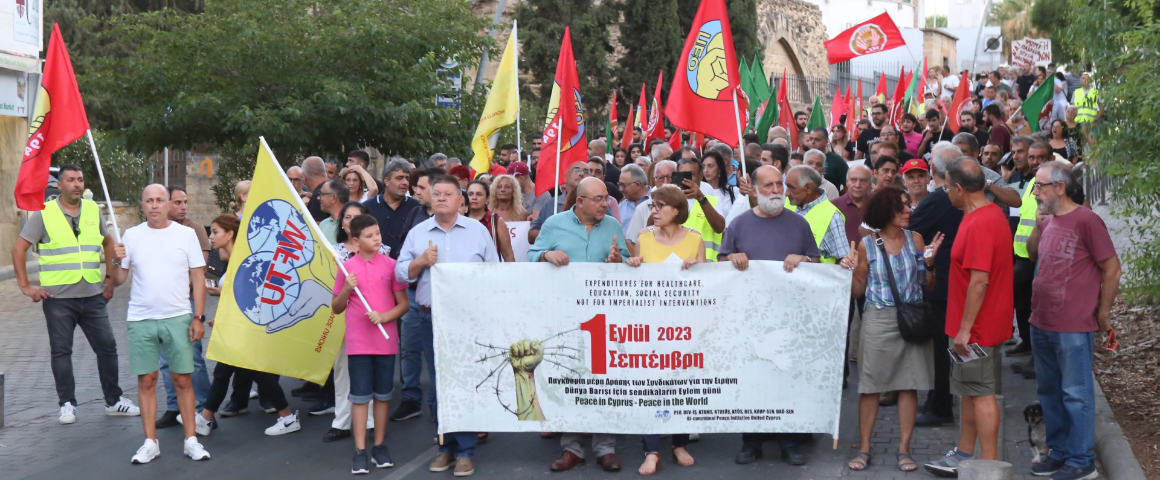September 1 International Day of Trade Union Action for Peace sees mobilizations around the world
By Dave McKee
Under the leadership of the World Federation of Trade Unions (WFTU) labour unions all over the world organized actions on September 1, calling for “more expenditures for healthcare, education and social security – not for NATO weapons and imperialist interventions.”
This is a strong example of what it means for unions to engage in class struggle, especially for unions in Canada where there are currently no WFTU affiliates. While there are certainly unions here which campaign for peace, disarmament and withdrawal from NATO, the labour movement generally veers away from action on such issues and outsources that work to the NDP, BQ or even the Liberals. The result is a union membership that is disengaged from these important issues, and labour’s effective endorsement of milquetoast solutions. This is a pity, since the labour movement has generally had solid policies in these areas.
For many years, the WFTU and its members have mobilized for the International Day of Trade Union Action for Peace, marking the invasion of Poland by Nazi Germany on September 1, 1939. The day was established by the global class-oriented trade union movement to remember and honour the millions of victims of fascism during World War Two, as well as the victims of imperialist war and aggression including through the expanding power and profiteering of monopoly capitalism.
In the call to this year’s day of action, the WFTU stressed the escalating danger of war. “Nowadays, the world is facing a phase of extreme intensification of political, economic and military antagonism. Imperialist forces – especially the US, NATO and European Union – aim to control and exploit our planet’s economic resources, strengthen their spheres of influence and redraw borders. Inter-imperialist antagonisms are constantly exacerbated, armed conflicts are maintained and intensified, and the dangers to world peace are grave.”
In response to the call, WFTU members and allies organized actions in their countries, calling for an immediate end to imperialist interventions, embargoes and sanctions, and demanding the dissolution of NATO and the dismantling of nuclear weapons arsenals. Many unions joined with peace organizations, particularly those affiliated with the World Peace Council, to call for an intensified struggle against current interventions and wars including the war in Ukraine, accelerated militarization of international relations, and soaring military expenditures. They also reiterated the need to fully respect the sovereignty, independence, and right of every people to freely choose the path of their economic and social development.
The WFTU drew attention to the impact that the economic aspect of war and aggression has on working people. “We denounce the exclusions, discriminations, embargoes and sanctions imposed by the US, NATO and the EU against various countries, as they negatively impact the standard of living of low-income families, workers, poor small farmers and the people in general.”
The global labour body also condemned the decision of the NATO Summit to add new Regional Plans and to push members of the military alliance to spend a minimum of 2 percent of their GDP on military spending. These actions, warned the WFTU Secretariat, “sharpen the confrontation and deepen the preparations and risk for a generalized imperialist conflict with disastrous consequences for the ordinary people who always pay the cost of imperialist antagonism through death, displacement and the deterioration of their living and working conditions.”
This year’s Day of Trade Union Action for Peace is especially important because of working people’s general experience of skyrocketing prices, high inflation and long-term austerity policies, all of which have severely diminished incomes and living standards around the world. As the WFTU noted, “In an era where all workers’ demands for education, health, social security and dignified living conditions are rejected by capitalist governments under the pretext of lack of resources, the further increase in military spending is provocative as well as revealing of their intentions.”
Do we really need a clearer statement about how capitalist priorities continually veer from the interests of working people, in order to fund the desires of profit-seeking monopolies?
In the current global dangerous situation – with the triple threat of generalized war, climate catastrophe and deep economic crisis – we might reasonably expect to see a large and growing anti-war movement with labour at its core. But this isn’t the reality today – instead, the mainstream view is that the road to peace is through war, and Ukraine is the example. Perversely, offers of a ceasefire and negotiations leading to a political solution are treated as a compromise instead of a victory, and compromise is considered an unacceptable defeat.
Part of the problem is that the drive to war is the predominant ideology in Canada, along with most advanced capitalist countries. But this is to be expected – perhaps a larger part of the problem is that the labour movement, which should represent the organized and class-conscious element of the working class, has been steadily retreating from a class struggle approach to war, militarism and international affairs. At the very least, this is true of the bulk of the labour leadership, who tend to be guided by right-wing social democratic ideology.
So, rather than a principled and class-based position against the war in Ukraine – and specifically the actions of Canada’s government, in lockstep with the war mongers in the US and NATO, to provoke and militarily encircle Russia – the Canadian Labour Congress issued a fluffy statement which called the invasion “unprovoked” and called for opening Canada’s borders to Ukrainian refugees. Of course, support for refugees from this or any war is important, and the fact that Russia was highly provoked doesn’t mean the invasion was justified.
But for the labour leadership to cast Russia as the sole aggressor, to ignore the years of provocation and aggression from the US-EU-NATO cartel, and to paint Ukraine’s far-right and murderous regime as the victim – this is an absolute abdication of working-class solidarity and internationalism. It is the highest union body, presenting to millions of workers a simplistic narrative with naïve black-and-white conclusions, that is larded with morality instead of even a basic class analysis. It suits the interests of the warmongers and severely hampers efforts to achieve peace and justice.
Labour in Canada needs to understand that the war, while seemingly far off in Ukraine, is seated on our doorstep right beside the more obviously immediate issues of falling wages, soaring prices, mass layoffs, climate crisis, privatization of health and social services, and many others. They’re all seated together precisely because they are all inter-related aspects of the contradictions of the capitalist society in which we live.
Labour in Canada needs to take a lead from the WFTU and directly link war and militarism with cuts to programs that serve working people’s needs – healthcare, education, childcare, climate and environmental justice, job creation, higher wages and living standards, social housing and more. By linking these issues, the labour leadership can put them back into the hands of working people and engage the incredible power of the working class to fight for their resolution.
It is illusory to believe that we can resolve these issues under capitalism – that can only occur with socialism, which replaces the logic of profit with a planned, democratic economy based on meeting human and environmental need. But at the same time, the threats are great, and the clock is ticking – we cannot wait for socialism but need to build the class struggle now to confront these dangers. Such a struggle can become a force for the fundamental change that is needed.
But labour needs to act. As the World Federation of Trade Unions clearly indicated on September 1, working people cannot choose between prosperity at home and peace at home – these are two parts of the same struggle.
[Photo: Unions in Cyprus mobilize for International Day of Trade Union Action for Peace]
Get People’s Voice delivered to your door or inbox!
If you found this article useful, please consider subscribing to People’s Voice.
We are 100% reader-supported, with no corporate or government funding.




